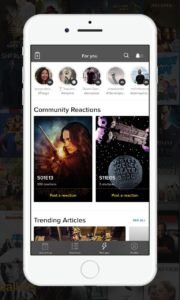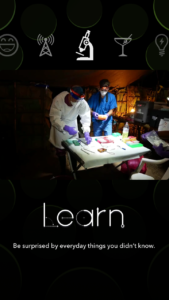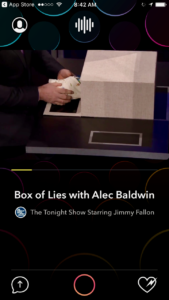In TV Time and Rheo, Two Apps Look to Transform Watching
As the television viewing experience continues to rapidly evolve, lots of smart startups are trying to figure out where they might profitably become a part of a new industry filled with bottomless content available across multiple devices just about everywhere and any time.In recent weeks, I've sat down with the people behind two of those apps, TV Time and Rheo, to talk about the state of what we'll generally call "television." They're trying to create tools that people can use to find, track, share and comment on video-related experiences. Their perspectives and approaches are very different, one focused more on traditional TV around the globe, the other on short video from many kinds of only sources. But there's a big nut here that needs cracking, and they're both bringing their own kind of hammer to the task. TV Time isn't, technically, new. It's a mashup of two existing apps, a shotgun marriage forced by the fast-evolving TV-watching environment. The CEO is Richard Rosenblatt, the Los Angeles entrepreneur whose first company sold MySpace.com to Fox for more than half a billion dollars and whose second, Demand Media, went public.Now Rosenblatt is trying to figure out if there's room for an app that empowers the TV watching experience across all those many outlets and amid time-shifting and the still-present desire by many to have a "water-cooler" conversation about the cool show they saw last night.Rosenblatt's first run at apps about TV, WhipClip, launched a couple of years ago, giving people the opportunity to create memes and other material using licensed clips from dozens of network shows."What we were wrong about is people didn't want to make clips themselves," Rosenblatt acknowledges. "The market changed and we saw the chaos and went looking through dozens of apps" for one that might expand and evolve what WhipClip was trying.Rosenblatt's team found a good fit in Scotland, acquiring the team behind an app called TV Showtime. The result is part next-generation electronic program guide, queuing up all your favorite shows' next appearances for you, and part virtual water cooler.But where Twitter, Facebook and other established social-media outlets are rife with spoilers for anyone who watches a show even a few hours after its debut, TV Time functions as a safe space for fans, only showing user-generated content about the episodes that a fan has already marked as having watched.Thanks to its forebears, TV Time already has about 2 million users, fairly evenly split between the iOS and Android versions of the app, and spread across the globe. It's partnered with stars of two shows, "Vikings" and "Orange is the New Black," to post regularly about their shows, and plans to add more. It also hosts about two-dozen podcasts about various popular programs. And once a fan has marked an episode as watched, they can post, rate and share their own comments, GIFs and memes about the program.TV Time, befitting its name, is about things that look like traditional TV, tracking more than 60,000 shows around the world, and more than 5 billion episodes. With $30 billion a year invested in traditional TV programming globally, there's plenty to keep up with for serious fans, Rosenblatt said, and without having to veer into YouTube or other online-only content."In a market this big and changing this fast, we're going to be 100-percent focused on TV," Rosenblatt said. "We're not going to be a general social-media app. We're a utility app that has social-media feathers."It's indeed an interesting app for the serious TV fan. Linking with content from popular shows' stars, providing that spoiler-free water cooler and allowing ongoing but time-shifted conversations all seem like winning ideas.And Rosenblatt has had a couple of winning ideas in the past. The question will be whether he can do it again, in another business changing as fast as social media did under the feet of MySpace (once he sold it to Fox) and content mills did after Demand Media went public.
TV Time isn't, technically, new. It's a mashup of two existing apps, a shotgun marriage forced by the fast-evolving TV-watching environment. The CEO is Richard Rosenblatt, the Los Angeles entrepreneur whose first company sold MySpace.com to Fox for more than half a billion dollars and whose second, Demand Media, went public.Now Rosenblatt is trying to figure out if there's room for an app that empowers the TV watching experience across all those many outlets and amid time-shifting and the still-present desire by many to have a "water-cooler" conversation about the cool show they saw last night.Rosenblatt's first run at apps about TV, WhipClip, launched a couple of years ago, giving people the opportunity to create memes and other material using licensed clips from dozens of network shows."What we were wrong about is people didn't want to make clips themselves," Rosenblatt acknowledges. "The market changed and we saw the chaos and went looking through dozens of apps" for one that might expand and evolve what WhipClip was trying.Rosenblatt's team found a good fit in Scotland, acquiring the team behind an app called TV Showtime. The result is part next-generation electronic program guide, queuing up all your favorite shows' next appearances for you, and part virtual water cooler.But where Twitter, Facebook and other established social-media outlets are rife with spoilers for anyone who watches a show even a few hours after its debut, TV Time functions as a safe space for fans, only showing user-generated content about the episodes that a fan has already marked as having watched.Thanks to its forebears, TV Time already has about 2 million users, fairly evenly split between the iOS and Android versions of the app, and spread across the globe. It's partnered with stars of two shows, "Vikings" and "Orange is the New Black," to post regularly about their shows, and plans to add more. It also hosts about two-dozen podcasts about various popular programs. And once a fan has marked an episode as watched, they can post, rate and share their own comments, GIFs and memes about the program.TV Time, befitting its name, is about things that look like traditional TV, tracking more than 60,000 shows around the world, and more than 5 billion episodes. With $30 billion a year invested in traditional TV programming globally, there's plenty to keep up with for serious fans, Rosenblatt said, and without having to veer into YouTube or other online-only content."In a market this big and changing this fast, we're going to be 100-percent focused on TV," Rosenblatt said. "We're not going to be a general social-media app. We're a utility app that has social-media feathers."It's indeed an interesting app for the serious TV fan. Linking with content from popular shows' stars, providing that spoiler-free water cooler and allowing ongoing but time-shifted conversations all seem like winning ideas.And Rosenblatt has had a couple of winning ideas in the past. The question will be whether he can do it again, in another business changing as fast as social media did under the feet of MySpace (once he sold it to Fox) and content mills did after Demand Media went public. I also talked recently with Rheo CEO Alan Cannistraro, a former Facebook and Apple product guy, about his just-launched iOS app (which includes an Apple TV version).Rheo showcases short video from all kinds of sources, including clips from the late-night talk shows, YouTube and more. The results are organized by categories such as Laugh, Chill, and Learn, and registered users can create their own video reactions to what they just watched, for an additional layer of content and engagement.That said, Rheo is more about curating cool content cropping up from many different sources, Cannistraro told me, and grouping it in logical ways that can appeal to the different moods a user might have at different points in their day or week.
I also talked recently with Rheo CEO Alan Cannistraro, a former Facebook and Apple product guy, about his just-launched iOS app (which includes an Apple TV version).Rheo showcases short video from all kinds of sources, including clips from the late-night talk shows, YouTube and more. The results are organized by categories such as Laugh, Chill, and Learn, and registered users can create their own video reactions to what they just watched, for an additional layer of content and engagement.That said, Rheo is more about curating cool content cropping up from many different sources, Cannistraro told me, and grouping it in logical ways that can appeal to the different moods a user might have at different points in their day or week. Such curation can be a challenge at scale, but Cannistraro believes it's what makes Rheo an important differentiator for people who enjoy short video of many kinds, but who also may want a more passive, lean-back experience tuned to their mood of the moment.If the app can routinely capture enough good material, and provide it in digestible form for extended viewing, then adding advertising to the streams on your phone or Apple TV should be straightforward enough. That's the path to profitability for Rheo, Cannistraro said. We'll see.The bigger question, I think, is how much people are ready to have a lean-back experience with short content on their mobile device (Apple TV seems a more natural setting for this). In the past, video "snacking" was largely driven by factors such as the site you were visiting, what your friends shared on your social feed, or what you stumbled across. All required some component of active seeking.As our habits evolve in this new world, we'll need new tools to navigate it happily. It'll be interesting to see if Rheo and TV Time can find a place on people's virtual dials.
Such curation can be a challenge at scale, but Cannistraro believes it's what makes Rheo an important differentiator for people who enjoy short video of many kinds, but who also may want a more passive, lean-back experience tuned to their mood of the moment.If the app can routinely capture enough good material, and provide it in digestible form for extended viewing, then adding advertising to the streams on your phone or Apple TV should be straightforward enough. That's the path to profitability for Rheo, Cannistraro said. We'll see.The bigger question, I think, is how much people are ready to have a lean-back experience with short content on their mobile device (Apple TV seems a more natural setting for this). In the past, video "snacking" was largely driven by factors such as the site you were visiting, what your friends shared on your social feed, or what you stumbled across. All required some component of active seeking.As our habits evolve in this new world, we'll need new tools to navigate it happily. It'll be interesting to see if Rheo and TV Time can find a place on people's virtual dials.

